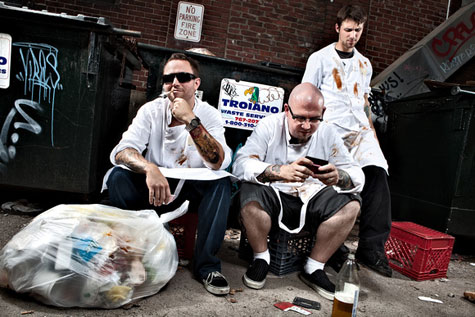 DISTINCT VARIATIONS Sidecar Radio. |
Sidecar Radio's EP Wave Principal was released in April 2008 and I've pretty much been listening to "Easy Gets So Hard" ever since. It's a song I can't ever get enough of and it has every right to be popular far beyond our little Pine Tree State. Hence my high expectations for the well-promoted Dreadnaught Cosmonaut, the band's third EP (to go with a single full-length).
To tell the truth, I was expecting another full-length. The last EP felt like a statement and I thought this was a band ready to knock out a major artistic work. But that's probably an outdated way of thinking at this point. The era of the single is returning, album sales are for crap, and what does knocking out a big album really get you nowadays -- other than a big bill from the recording studio?
So, if more releases on a more frequent basis is the new paradigm, the real question is: How well do Sidecar operate within it?
What's appreciated here is that the band not only pack the EP with single-worthy songs, high-energy and meaty, but they also play off some of the standard "album" techniques: a quiet song second to last, a mid-disc ballad to break up the heavier numbers, transitional vignettes. Sidecar also continue to evolve their sound, keeping the upstroke/white-reggae core of their sound and refining it. Frontman Christian Hayes still features that nasal, pinched accent, but it's not as much Bradley Newell by way of Dave Gutter as it once was. He's incorporated some early-Police Sting and even a bit of Eddie Vedder as his delivery is diversified across the breadth of the six-song record.
What hasn't changed at all is the quality of Hayes's backing. I'm enthralled with Corey Tibbetts's bass playing on this entire record. It's lyrical and melodic, and allows for Hayes's guitar to mostly focus on the upstroke chimes and general guitar wash for effect. Similarly, Jason Stewart's drumming is among the best in town, subtle on what's actually a pretty loud record and incredibly crisp. His cymbal work, especially, is something to which it's worth paying attention.
And while there isn't an "Easy Gets So Hard" here, there are a few very strong choruses, and the band do well to write distinct verses and choruses that vary both volume and genre approach so that it's more than just the quiet/loud dynamic that generally characterizes radio rock. The disc's opener, "Hospital's on Fire," introduces you immediately to Hayes's dense lyric-writing, hip-hop-like in its desire to cram as much as possible into three-plus minutes -- or five minutes, or six. Both "Price to Pay" and "Jaundice" fairly sprawl, maybe going a tad longer than is wholly necessary. The lyrics are often abstract, too, compounded by Hayes's accented pronunciation and enunciation, so there's plenty of interpretation to be done here, whether you choose to read the supplied lyrics or not.
What to make of the conclusion to "Price to Pay," nominally a song about prostitution? "I had a one night stand with murder, farewell/I fucked murder so hard she left the room and killed herself." Couple that with sentiments like "Funeral for the Major Key" or "God's become a liar" or "Devil Was a DJ" and you could call the record pessimistic, Hayes conveying a certain dissatisfaction with the cards he's been dealt. But there is a defiance, too, and it doesn't come off as whiny.